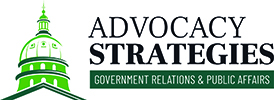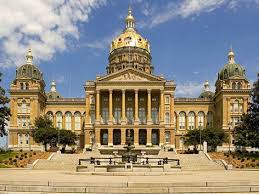This Week in the Iowa Legislature
Lawmakers quickly transitioned into floor action following a couple of intense weeks before the funnel deadline, marking the next phase of the legislative session. With the focus shifting from a steady stream of subcommittee and committee meetings to caucus discussions and floor debates, the pace at the Capitol has not slowed down.
Iowa’s Revenue Forecast Updated Amid Economic Uncertainty
The Iowa Revenue Estimating Conference (REC) met Thursday to update state revenue projections, citing economic uncertainty while affirming Iowa’s strong fiscal standing.
For Fiscal Year 2025, Iowa’s projected tax revenue was revised slightly downward from $9.15 billion to $9.13 billion, reflecting a 6.4% decline from the previous year’s revenues. Looking ahead to FY 2026, revenues are now expected to decrease by 6.9% to $8.5 billion, a $626.7 million drop from FY 2025. These adjustments stem from the effects of newly enacted tax cuts, including the transition to a 3.8% flat individual income tax rate and a gradual corporate tax reduction. This basically guarantees lawmakers will have to dip into reserves to meet the Governor’s recommended spending levels.
Despite the revenue decline, Governor Kim Reynolds emphasized Iowa’s financial stability, pointing to reserve funds and disciplined budgeting. However, Democratic lawmakers raised concerns about reliance on one-time funds to balance the budget, particularly as spending commitments, including the Education Savings Account program, increase.
Economic uncertainties—including potential tariff impacts, commodity prices, and stock market fluctuations—make long-term projections difficult, but the 3-person panel believes Iowa remains on solid financial footing. Lawmakers will use these updated estimates as they begin budget negotiations for FY 2026 in the coming weeks.
Major Property Tax Overhaul Introduced
Iowa lawmakers have unveiled a sweeping property tax reform proposal that would mark the state’s most significant overhaul since 1977. House Study Bill 313 and Senate Study Bill 1208 aim to provide $426 million in tax relief by capping most property tax levy growth, increasing exemptions for seniors and veterans, and shifting some school funding responsibilities from property taxes to the state’s general fund.
- Supporters argue the legislation will provide long-term property tax relief for Iowans; Simplify the tax system by eliminating the complicated rollback mechanism; and give local governments more predictability when budgeting.
- Opponents, express concerns that previous GOP-led tax reforms have not prevented rising property tax bills; Shifting school funding to the state’s general fund could lead to future budget shortfalls; and Local governments may struggle to maintain essential services under the proposed revenue caps.
While Republican leaders are calling the bill a “complete system reboot,” they acknowledge it is a work in progress and are inviting input from stakeholders before moving forward. Public hearings on the legislation are expected in the next couple of weeks, making this a critical moment for local officials, businesses, and taxpayers to weigh in. Stay tuned for updates as the debate unfolds as this will likely be the heart of the discussion outside of the budget as the legislature works toward adjournment.
Republicans Win House Special Election
Following the passing of Rep. Martin Graber in January, District 100 serving most of Lee County was left vacant until Tuesday night. Rep.-elect Blaine Watkins graduated from Grand View University just this past December with a degree in Political Science and Government. He beat Democrat candidate Nannette Griffin with a very slim majority of less than 200 votes. With this win, Iowa House Republicans have maintained their 67-33 supermajority. Watkins will serve out the rest of the late Martin Graber’s term which will run through 2026.
Bills Sent to the Governor
- THC-infused drinks (HF 181) would add THC-infused drinks to the existing state law that prohibits open containers of alcoholic drinks in motor vehicles.
- Grooming Sex Offenders (HF 180) places any individual convicted of the new state crime of grooming on the state’s sex offender registry. This bill which passed unanimously through the Senate and with bipartisan support in the House is currently on its way to Gov. Reynolds desk to be signed.
Notable Bills Passed This Week
- Obscene Materials (HF 306) increases the penalty for knowingly showing a minor obscene material, the bill was passed 88-0 in the House and is now on its way to the Senate.
- Child Victims Remote Testimony (HF 602) would allow for children who are victims of a crime to give their testimony remotely instead of facing their alleged abuser. It passed 95-1.
- Public Union Lists (SF 472) would allow for Iowans to petition a district court to order public employers to provide lists of their employees to the state as part of the union bargaining process. It passed 32-15 and is on its way to the House.
- Anti-SLAPP bill (HF 472) is a bill that allows Iowans to request a rapid dismissal of a lawsuit on the grounds of free speech. The legislation passed unanimously and pushes back against strategic lawsuits against public participation.
Discussed but No Action this week:
- Fireworks (SF 303) would further restrict a county or city from further regulating the use of consumer fireworks. There were Republican amendments filed on both sides of the argument, one that would allow restrictions outside of specific days and another that would allow no restrictions on the use of fireworks by local government. There will be more to this story before this bill goes to the Governor, if that is its fate.
- Governor’s Childcare/Preschool Programs (SF 445) was on the Senate debate calendar but never came up for discussion. This bill would create a new avenues and funding structures for Iowa families to access 4-yr-old preschool programs with wraparound childcare services. The purpose of the program is to increase access for all 4-year-olds across the state.
- Barber Cosmetology Training Program (HF 711) was on the House Debate Calendar but never made it to the floor. The bill would create a duplicate training program, a copycat of the existing apprentice program, for barber cosmetologists in licensed establishments (salons or barbershops) allowing the student to cut and color hair with no training and minimal supervision.
Looking Ahead
As we roll in to the 10th week of session – my how time flies – the chamber calendars tell us we will see more of the same as week 9. The House and Senate leaders have identified floor debate as their priority so they can move bills to the opposite chamber for consideration. We expect to see subcommittee work pick up as the bills are passed from one chamber to the next. Outside of that, we will start to see the bill list narrow as each chamber needs to decide what its most pressing priorities are as we inch closer to the second funnel deadline and the end of session. To stay up to date on scheduled committees and subcommittees and their virtual access information, follow this link.

